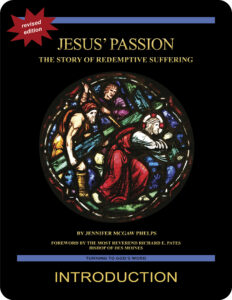Passion
 Passion Sunday celebrates the entry into Holy Week as the Church prepares to commemorate the Passion and Resurrection of Jesus. We refer to this event a great deal during Holy Week, but how well do we understand what the word passion means?
Passion Sunday celebrates the entry into Holy Week as the Church prepares to commemorate the Passion and Resurrection of Jesus. We refer to this event a great deal during Holy Week, but how well do we understand what the word passion means?
The word and concept enter English in a number of ways. The most obvious are the words passion and compassion. In less obvious forms, we also see pathos and apathy. What, then, does passion mean precisely? What does it have to do with the death of Jesus?
As usual, Greek proves useful in unraveling this mystery. The Greek word at the root of these concepts is πάσχω (pascho), which means “to have happen” or “to be affected,” and in these senses, it also can mean “to suffer.” Pascho is a concept that at its root seems to be neutral and simply refers to experiencing something. This can manifest in being affected by an interest or passion, by joining in the feeling of another through compassion, by being open to being affected by others through pathos, or by being unfeeling or unaffected in apathy. All of these concepts are manifestations of pascho.
How does this concept come to play in referring to the Passion of Jesus? First, let’s note one false etymology connected with this idea. The term paschal is not related to pascho but rather comes from Hebrew פֶּסַח (pesach), meaning “the passing over.” What passion means in the context of the Passion of Christ is twofold. Obviously and most notably it refers to Jesus’ suffering. In a broader and perhaps more primary sense, it refers to the preeminent experience of Christ, the central and most significant
experience Jesus encountered, his Passion.
you also may like our free Lenten study of Jesus’ Passion (digital only)
 Jesus’ Passion: The Story of Redemptive Suffering is a five-lesson Catholic Bible study offering an in-depth look at the biblical foundations of the movie The Passion of the Christ. This revised study, which has been granted an imprimatur, contains all of the original material of the 2004 edition as well as many new features in an improved, reader-friendly format. Click on the book’s cover to view the introduction. Free digital lessons of Jesus’ Passion: The Story of Redemptive Suffering are available on the website during Lent.
Jesus’ Passion: The Story of Redemptive Suffering is a five-lesson Catholic Bible study offering an in-depth look at the biblical foundations of the movie The Passion of the Christ. This revised study, which has been granted an imprimatur, contains all of the original material of the 2004 edition as well as many new features in an improved, reader-friendly format. Click on the book’s cover to view the introduction. Free digital lessons of Jesus’ Passion: The Story of Redemptive Suffering are available on the website during Lent.
 Click on the picture of the statue of Moses with horns (above) to learn more about Lost in Translation. A new entry is archived each Monday. Contact us to receive Lost in Translation by email every week. You may use any of the contact links on our website to ask Matthew a question.
Click on the picture of the statue of Moses with horns (above) to learn more about Lost in Translation. A new entry is archived each Monday. Contact us to receive Lost in Translation by email every week. You may use any of the contact links on our website to ask Matthew a question.
